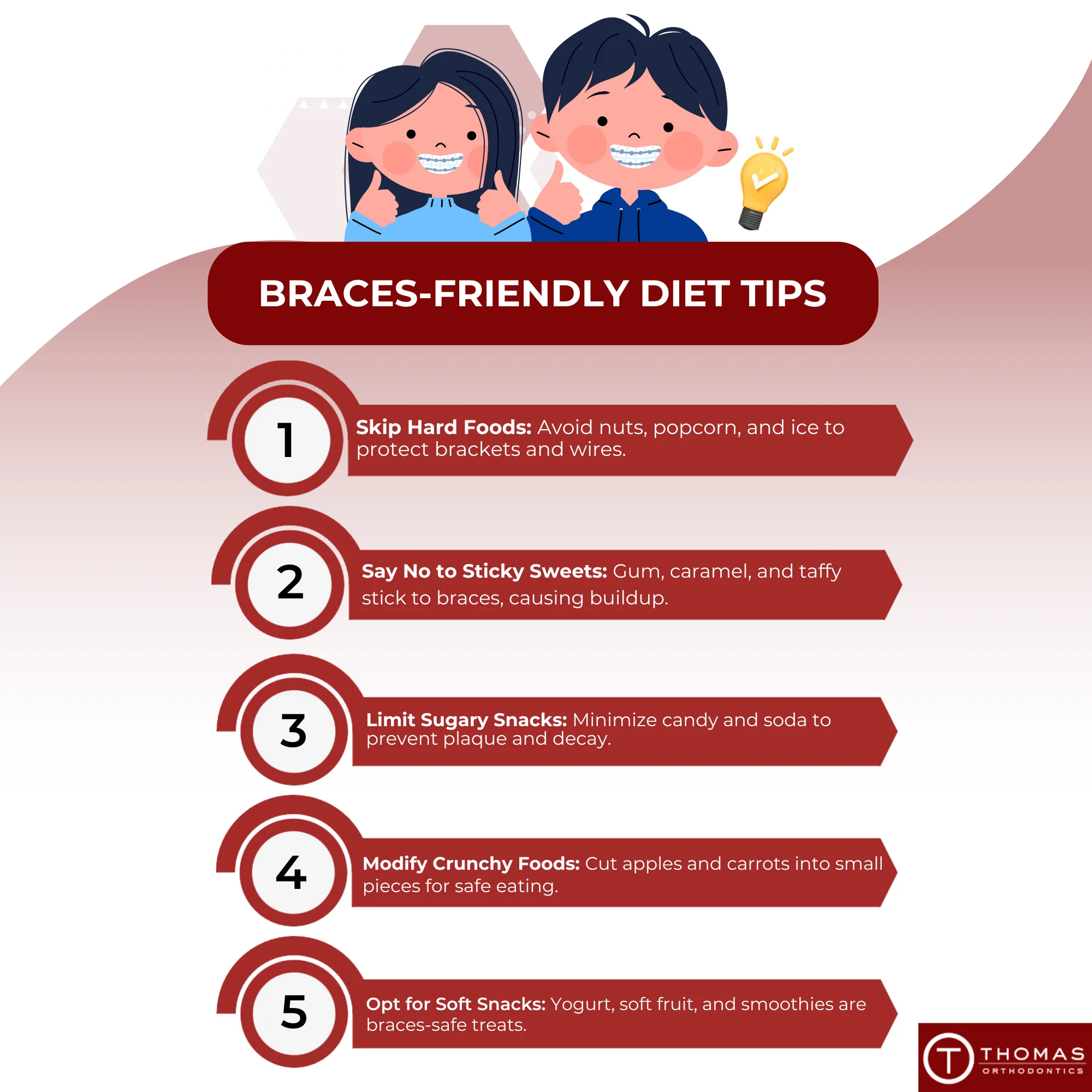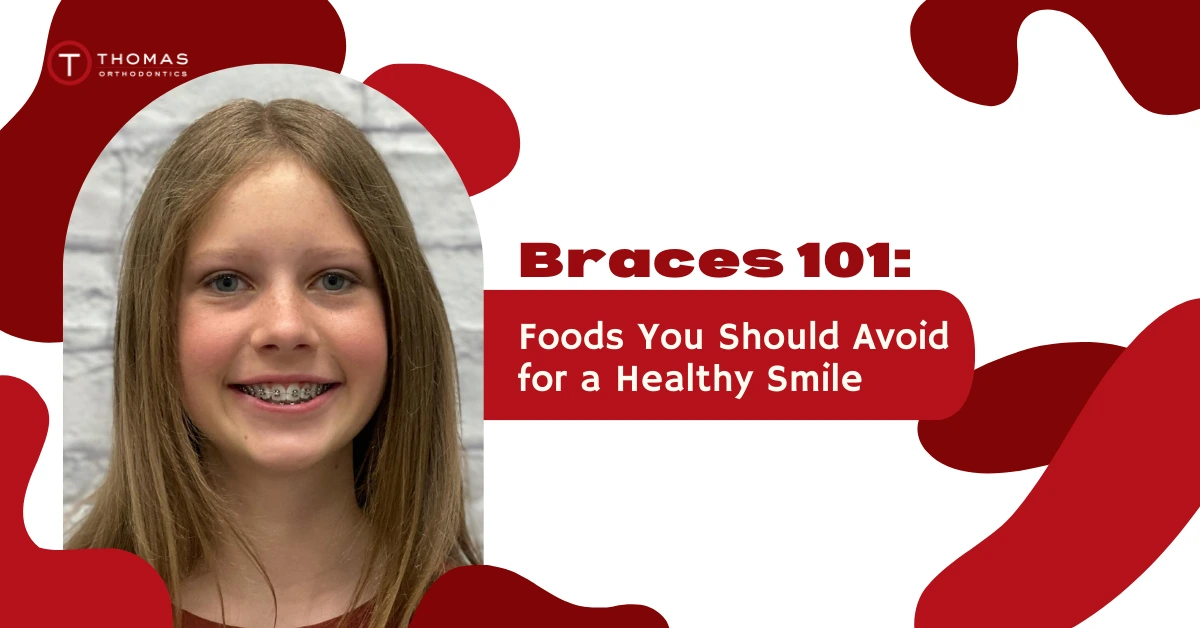To maintain a healthy smile, you’ll need to steer clear of specific foods that can harm your teeth. Hard foods like nuts, chips, ice, and hard rolls can damage tooth enamel and dental work. Sticky foods such as caramel, taffy, and chewing gum can stick to your teeth, leading to plaque build-up and cavities. Equally, sugary foods and those high in refined carbohydrates can exacerbate tooth decay and gum disease. Swapping these problematic foods with softer, nutritious alternatives is essential for your dental health. As you go further, you’ll discover more about maintaining healthy teeth through dietary choices.

Key Takeaways
- Hard foods like nuts and popcorn can damage wires and brackets, increasing the risk of prolonged orthodontic treatment.
- Sticky foods such as caramel and gummy bears can adhere to braces, complicating cleaning and increasing cavity risk.
- Sugary foods and those high in refined carbohydrates contribute to plaque buildup and dental issues.
- Certain foods like pizza crust, crunchy vegetables, and chips can dislodge brackets and bend wires, leading to discomfort and treatment delays.
- Maintaining oral hygiene and opting for softer food alternatives can support overall dental health and reduce the risk of cavities and gum disease.
Why certain foods need to be avoided with braces
Steering through the world of food choices with braces can be a bit tricky. You may be wondering, “What foods can you not eat with braces?” There are certain foods to avoid with braces to guarantee they stay intact and effective.
The worst food for braces includes those that are hard, sticky, or high in sugar. Hard foods, like nuts or popcorn, can cause damage by breaking or dislodging the wires and brackets of your braces.
You’ll also want to steer clear of sticky foods such as caramel or taffy, which can get stuck and be difficult to remove, leading to potential damage or decay. Sugary foods pose a risk too, as they can lead to plaque build-up and cavities, which are more challenging to manage with braces on.
Even some healthy foods, like raw vegetables or hard fruits, can be problematic. You don’t have to eliminate them completely, just prepare them differently. For instance, cut apples into small, manageable pieces instead of biting directly into them.
Foods to completely avoid with braces
While braces are a terrific tool for achieving a healthy smile, they require a certain level of care when it comes to food choices.
You’ll want to steer clear of popcorn, nuts, ice, chewing gum, and hard candy.
These items can damage your braces and hinder your progress towards a perfect smile.
Popcorn
When thinking about foods to avoid while wearing braces, popcorn should definitely be on your list. This seemingly harmless snack can cause a host of problems for those with orthodontic appliances.
The braces food restrictions usually include hard, sticky, or crunchy foods, and popcorn ticks all these boxes. The kernels can easily get lodged in the brackets and wires of your braces, making it a food bad for braces. Not only is it difficult to remove these trapped particles, but it could also lead to plaque buildup and cavities over time.
In addition, biting into an unpopped kernel can potentially damage your braces, leading to an unplanned visit to your orthodontist.
Apart from the hygiene issues, popcorn can cause discomfort if the lodged popcorn hulls irritate the sensitive gum tissues around your braces. This could lead to inflammation and even infection if not addressed promptly.
Nuts
If you’re wearing braces, your orthodontist‘s advice likely includes bidding a temporary farewell to nuts. This is a significant part of the list of what foods not to eat with braces.
Nuts, whether they’re almonds, walnuts, or peanuts, are hard on the brackets and wires of your braces. They can cause them to loosen, or worse, break entirely – an issue that can lengthen your treatment time and result in additional visits to your orthodontist.
These beloved snacks are a food braces avoid for good reason. They’re not only a risk to the structure of your braces but also pose a threat to the health of your teeth.
Nut particles can easily get stuck in the crevices of your braces and prove difficult to remove even with thorough brushing and flossing.
As you venture into the phase post-braces, it’s vital to remember the foods to avoid after braces. Even though your braces are off, your teeth are still settling into their new positions.
Hence, avoiding hard foods like nuts can help maintain your new, straight smile. It might be a tough nut to crack, but it’s worth it for a healthy smile.
Ice
You might be surprised to find ice on the list of foods to avoid with braces.
However, the hardness of ice can potentially damage the brackets and wires of your braces, leading to discomfort and prolonged treatment time.
You might wonder, when can you eat hard food with braces? The answer, unfortunately, isn’t straightforward.
It largely depends on the type of braces you have and the progress of your treatment. However, as a general rule, orthodontists recommend avoiding hard foods, particularly ice, for the entire duration of your treatment.
Ice is a tricky food to consume.
Despite being a liquid at room temperature, when frozen, it becomes a hard, brittle substance that can easily fracture a tooth or dislodge a bracket.
And while it’s tempting to enjoy a chilled bite on a hot day, the risk to your orthodontic investment is too high.
Chewing gum
Chewing gum is another item on the list of foods to completely avoid with braces. You might be wondering why, given that gum isn’t hard or crunchy. The issue is its stickiness. When you chew gum, it can easily become lodged in your braces, making it difficult to remove. This can lead to plaque buildup, which may cause tooth decay and gum disease.
Moreover, the constant chewing action can put undue stress on your braces, potentially damaging the brackets and wires. This damage could prolong your treatment time and result in additional visits to the orthodontist for repairs.
It’s also worth noting that while sugar-free gum may seem like a safer option, it’s still sticky and poses the same risks.
Instead of gum, consider alternatives like sugar-free mints, which can freshen your breath without the sticky mess.
Hard candy
Hard candies are another major offender on the list of foods to completely avoid when you’re wearing braces. You might be wondering why. Well, hard candies pose a two-fold problem for your oral health, especially with braces.
Firstly, their hard texture can cause significant damage to your braces. The pressure exerted when you bite down on these candies can break brackets, bend wires, and dislodge bands, leading to unplanned orthodontic visits and potential delays in your treatment progress. It’s simply not worth the risk.
Secondly, hard candies dissolve slowly, leading to prolonged exposure of your teeth to sugar. This extended sugar exposure increases the risk of tooth decay, especially as braces create additional hard-to-clean areas where food particles can get trapped. This problem is further amplified if you’re not diligent with your oral hygiene routine.
In essence, for the sake of your braces and overall oral health, it’s best to steer clear of hard candies. Focus instead on braces-friendly foods that won’t compromise your treatment or dental health.
Chewy candy
The allure of chewy candy can be hard to resist, but these sweet treats are a nightmare for anyone wearing braces. They stick to the brackets and wires, making them difficult to clean. This trapped sugar can lead to plaque build-up, which increases your risk of cavities and gum disease.
Even more concerning, chewy candies can physically damage your braces. They can bend the wires and dislodge the brackets, leading to discomfort and potentially prolonging your treatment. That’s why it’s best to stay away from chewy candies such as taffy, gummy bears, and caramel.
But don’t fret. There are plenty of braces-friendly alternatives. Opt for soft, non-sticky sweets like chocolate or ice cream.
And remember, moderation is key. Consuming excessive amounts of any sweet treat, even those that are braces-friendly, can still harm your oral health.
Maintaining a healthy diet is essential during your orthodontic treatment. It helps keep your teeth and gums healthy, guarantees your braces function properly, and can even speed up your treatment process.
Pizza crust
Craving a slice of your favorite pizza? While the cheesy goodness might seem irresistible, you should give a second thought if you’re wearing braces. The culprit behind the concern isn’t the topping, but the pizza crust.
Pizza crust, especially when it’s well-done or crispy, poses a threat to your braces. Its hard texture can cause brackets to break off or wires to bend, leading to discomfort and unnecessary dental visits.
Here’s why pizza crust should be off-limits if you’ve got braces:
- Bracket Damage: Crispy pizza crust can easily snap off a bracket, leading to discomfort and a trip to the orthodontist.
- Wire Distortion: Biting into a hard crust can bend your wires, affecting the alignment process your braces are working on.
- Extended Treatment: Frequent damage might extend your treatment time, keeping you in braces longer than necessary.
To keep your braces intact and your orthodontic treatment on track, it’s best to skip the crust. Enjoy the cheesy, saucy part of the pizza to satisfy your craving without jeopardizing your smile.
Bagels and other hard rolls
When it comes to breakfast favorites, bagels and other hard rolls may top your list. Yet, if you’re wearing braces, you might want to rethink your morning routine. These foods can pose a challenge for your orthodontic appliances due to their hard and chewy texture.
Bagels and hard rolls can cause damage to your braces. They’re hard to bite into, which can lead to bent wires or dislodged brackets. This not only affects the effectiveness of your treatment but may also lead to unnecessary visits to the orthodontist for repairs.
Moreover, these foods are often high in refined carbohydrates, which can contribute to plaque buildup around your braces and teeth. Over time, this could lead to cavities, gum disease, and other dental problems.
In place of bagels and hard rolls, consider softer alternatives. Whole grain toast, soft tortillas, or scrambled eggs are excellent choices. You’ll still enjoy a satisfying breakfast without jeopardizing your braces or dental health.
Crunchy vegetables and fruits
If you’re a fan of crunchy vegetables and fruits, you might find it challenging to keep up with your dietary preferences while wearing braces. These hard foods aren’t your friends when you’re sporting orthodontic equipment. They can cause damage to the brackets and wires, leading to discomfort and potentially prolonging your treatment time.
Here’s why you should reconsider your crunchy cravings:
- Potential Damage: Biting into a hard apple or munching on carrots can easily dislodge the brackets or bend the wires of your braces. This not only causes discomfort but also disrupts the progress of your treatment.
- Increased Pain: Eating hard foods can create additional pressure on your teeth and gums. This might amplify the discomfort you’re already experiencing from the braces, especially shortly after adjustments.
- Lengthened Treatment Time: Damage to your braces often means more frequent visits to your orthodontist for repairs. This can prolong the duration of your treatment, delaying that beautiful smile you’re working towards.
Hard crackers
Despite your love for hard crackers, it’s important to steer clear of them when you’re wearing braces. The tough texture of these snacks can exert unnecessary pressure on your braces, potentially damaging wires and brackets. When damaged, braces become less effective in aligning your teeth and may delay your progress. Unfortunately, this could extend your treatment duration, which is typically between 12 to 36 months.
Furthermore, pieces of hard crackers can also become lodged between your braces and teeth, posing a risk for cavities. Proper oral hygiene is vital when wearing braces, but hard crackers can make cleaning more difficult. Even with meticulous brushing and flossing, it might be challenging to remove all the trapped food particles.
Instead of hard crackers, opt for softer alternatives that won’t harm your braces or compromise your oral health. Foods like soft whole grain bread, cooked vegetables, and ripe fruits are excellent options.
Pretzels
Much like hard crackers, pretzels are another snack you’ll need to cross off your list during your orthodontic treatment. The crunchy texture, while enjoyable, poses a significant risk to your braces. Their hardness can potentially lead to the breaking of brackets or wires, disrupting your treatment process and causing unnecessary discomfort.
Here are three reasons why pretzels are bad news for your braces:
- Breaking brackets: Pretzels are hard and can easily break the brackets on your braces. This not only disrupts your treatment plan but also leads to additional visits to your orthodontist for repairs.
- Dislodging wires: The force you use to bite into a pretzel can dislodge the wires of your braces. When these wires are out of place, they can poke your mouth causing discomfort and even injury.
- Stuck food bits: Pretzels can easily get stuck in your braces, leading to plaque buildup and tooth decay. This can potentially derail your journey to a healthier smile.
In a nutshell, while pretzels may seem like a harmless snack, they can cause significant problems for your orthodontic treatment. It’s best to avoid them until your braces come off.
Chips
Similar to pretzels, chips are another food item you should avoid while undergoing orthodontic treatment. These crunchy snacks might be tempting, but they’re a no-go when it comes to maintaining the health of your braces.
Why, you ask? Well, the hard texture of chips can cause brackets to break or wires to bend, disrupting the progress of your treatment. Chips, especially those that are particularly hard or crunchy, can apply excessive pressure to your braces.
This force may lead to loosening or breaking of the brackets, which can cause discomfort and extend your treatment time. Besides, small pieces of chips can easily get lodged between your braces, leading to plaque buildup and potential cavities.
Moreover, the starch in chips is converted into sugar in your mouth, which can contribute to tooth decay. So, while you might crave that satisfying crunch, it’s best to resist the temptation for the sake of your smile.
Don’t worry, there are plenty of braces-friendly snack options out there, like soft fruits or yogurt. Remember, your commitment to avoiding certain foods now will pay off with a healthy, beautiful smile in the future.
Maintaining dental health with braces
Your journey to a healthier smile shouldn’t mean compromising on dental health. When you’re wearing braces, certain food habits need to be tweaked to guarantee your braces do their job and your teeth stay healthy.
- Avoid Hard Foods: Hard foods can damage the brackets and wires of your braces. Avoid biting into apples, hard candies or crusty bread directly, and opt for softer foods or cut them into smaller pieces.
- Steer Clear of Sticky Foods: Sticky foods like candies, caramel, or gum can stick to your braces, making them difficult to clean and potentially leading to cavities.
- Limit Sugary Foods: Sugary foods and drinks, like soda or chocolate, can increase the risk of tooth decay and gum disease.
It’s harder to clean your teeth properly when you’re wearing braces, so it’s best to limit these.
Frequently Asked Questions
What Are Some Braces-Friendly Alternatives to My Favorite Foods?
Instead of hard or sticky foods that can damage braces, opt for softer alternatives. Love apples? Try applesauce. Craving candy? Go for a chocolate bar instead of caramel. It’s all about smart substitutions.
How Can I Clean My Braces After Eating Sticky or Hard Foods?
You should carefully brush around your brackets and wires after eating sticky or hard foods. Flossing between braces is important too. Using a water flosser can help remove food particles trapped in hard-to-reach places.
Do I Need to Avoid Any Drinks While Wearing Braces?
Yes, you should avoid sugary and acidic drinks like sodas or citrus juices. They can lead to tooth decay and discoloration. Stick to water, milk or unsweetened tea for a healthier smile with braces.
How Can I Manage Discomfort While Eating With New Braces?
You’ll initially feel discomfort when eating with new braces. Try softer foods and use over-the-counter pain relievers. Your mouth will gradually adjust, making it easier to eat. Remember, your orthodontist’s team is always ready to help.
Are There Any Exceptions to the ‘Foods to Avoid’ List for Braces Wearers?
Yes, exceptions exist. It’s about how you consume food. For instance, apples are on the ‘avoid’ list, but you can eat them sliced. Similarly, you can enjoy corn off the cob. Always remember to chew gently.
Conclusion
Well, there you have it! No need to go cold turkey on all these foods, but moderation and mindful choices are key. Remember, Rome wasn’t built in a day, and neither is a healthy smile. Maintain good dental hygiene, especially if you’re wearing braces, and guarantee your diet is tooth-friendly. With these tips in mind, you’re set for a future of radiant, healthy smiles.


